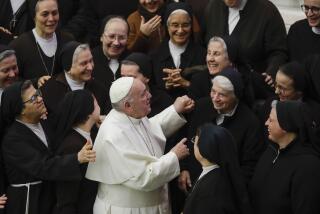Cardinal Agostino Casaroli; Was a Key Vatican Official
- Share via
VATICAN CITY — Cardinal Agostino Casaroli, who formerly was second in command to the pope and was credited for preserving the church in Eastern Europe during the Cold War, died Tuesday at 83.
Casaroli, who died in a Rome hospital, had suffered from heart problems.
The Italian cardinal had the title secretary of state of the Vatican from 1979 until 1990.
Pope John Paul II, in a condolence note Tuesday, praised the tailor’s son from Piacenza in northern Italy for “carrying out with refined diplomatic sensitivity courageous and significant steps, in particular for improving the situation of the church in Eastern Europe.”
Casaroli was seen as a consummate diplomat and an extremely loyal official. He and the pope, who had preferred a more uncompromising stance in diplomacy, clearly had reconciled any differences as the years went on.
As the Vatican’s foreign minister, Casaroli worked for 25 years to achieve the historic 1989 handshake between the pope and Mikhail Gorbachev, which became a memorable photograph. The Italian media dubbed Casaroli “Monsignor Perestroika.”
In 1989, Casaroli guided the Vatican to the resumption of diplomatic ties with the pope’s native Poland. Hungary and Czechoslovakia followed suit in early 1990.
More satisfaction came in April 1990, when the pope made a triumphant visit to newly democratic Czechoslovakia, whose former communist leaders had persecuted the church for 40 years.
The policy toward Eastern Europe, known as the Vatican’s Ostpolitik, was the inspiration of Pope John XXIII after the hard line taken by Pope Pius XII during the years of Stalinist repression.
Pope Paul VI, who took over in 1963, implemented the policy, working closely with Casaroli, sending the prelate on frequent missions to communist capitals.
Casaroli was given credit for the tough language on human rights and religious liberty in the 1975 Helsinki accords.
He also aided nations in diplomatic wrangling over individuals--enabling Hungarian Cardinal Jozsef Mindszenty to leave his refuge in the U.S. Embassy in Budapest in 1971 after 15 years.
Beyond the diplomatic field, Casaroli kept the Vatican running smoothly after the pope was wounded by a Turkish gunman in 1981.
“A great trepidation, a great hope--we are united in prayer,” Casaroli told a Times Rome correspondent on returning from New York to visit the hospitalized pope and take charge of the Vatican.
Casaroli went to Rome in 1936 to study at the Vatican’s elite diplomatic school, the Pontifical Ecclesiastical Academy. He was ordained in 1937 and spent his entire career based in the Vatican.
More to Read
Sign up for Essential California
The most important California stories and recommendations in your inbox every morning.
You may occasionally receive promotional content from the Los Angeles Times.












